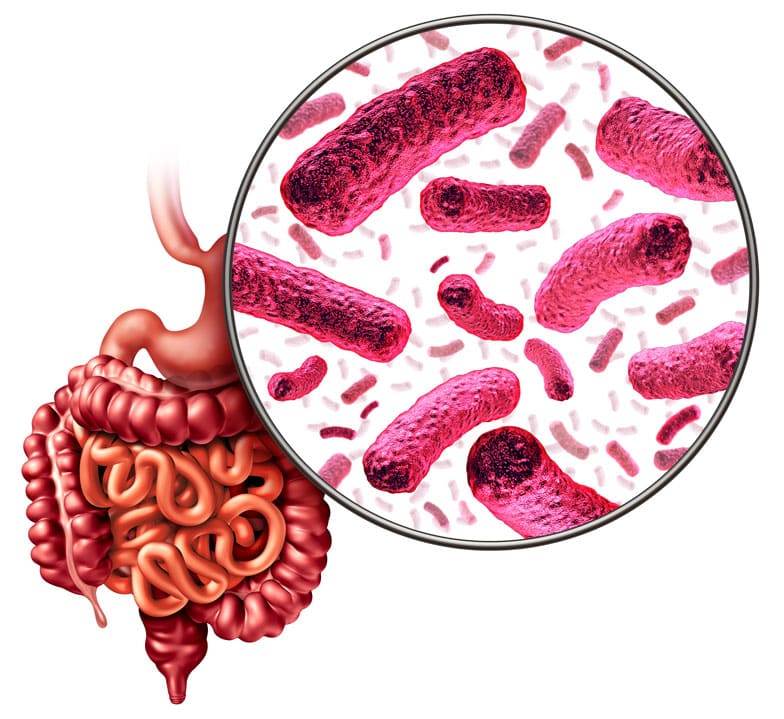Disturbed intestinal flora
& Digestive problems
By definition, intestinal flora means the totality of all microorganisms living in the intestine. These can be altered in their diversity or distribution, so that the intestine is disturbed in its function. One then speaks of a disturbed intestinal flora.
What is intestinal flora?
Our intestinal mucosa is colonized by about 100 trillion bacteria. The diversity extends to over 1000 different microorganisms, including bacteria as well as intestinal fungi. The exact definition of the intestinal flora thus includes the totality of microorganisms living in the intestines of humans and animals, also called intestinal microbiome.

Our intestinal microbiome comprises about 100 trillion bacteria. This corresponds to a weight of 2-3 kilograms.
What is the function of the intestinal flora
and why do we have these bacteria in us?
The composition of our intestinal flora, which also determines the prevailing intestinal environment, has a significant influence on our health and well-being.
How well we digest and utilize our food depends on the microorganisms in our intestines. For example, they stimulate mucus formation and intestinal peristalsis. Hard-to-digest plant substances (so-called dietary fiber) are broken down by the bacteria using special enzymes. This produces short-chain fatty acids, which are used for energy production on the one hand and also nourish the intestinal cells themselves on the other. They thus play a major role in the prevention of chronic inflammatory bowel diseases and colon cancer.
The lactobacilli and the bifidobacteria produce lactic acid. This lactic acid forms a protective layer on the intestinal wall so that pathogens and toxins cannot enter the blood. Furthermore, it is also a source of energy for the cells of the intestinal mucosa and influences the PH value and thus the environment. This is also the reason why foods containing lactic acid, such as kombucha tea or sauerkraut, support the immune system.
Furthermore, the bacteria are able to produce various vitamins, such as vitamin B2, B12 and K. These are subsequently released into the bloodstream and are important for the formation of red blood cells (vitamin B12) or blood clotting (vitamin K), among other things.
Various toxins such as heavy metals, bisphenol A or perchlorates are bound by intestinal bacteria and subsequently increasingly broken down and excreted.
And last but not least, the intestine contains the big topic of the immune system. Nowadays in all mouth and nevertheless with difficulty imaginable. Is it really true that 80% of our immune system is hidden in our intestines?
Intestinal flora and immune system
Our intestines actually contain a very large and important part of our immune defense. It becomes a little easier to imagine when you realize that the surface of the intestine is about 200 times larger than the surface of our body. At the same time, this area of over 400m² represents the largest contact surface with the outside world. It is therefore of fundamental importance that at this interface it is precisely controlled which substances are granted “admission” into the body and which (foreign) substances should be repelled and excreted – the distinction between friend and foe.
What does a disturbed intestinal flora mean
and what does nutrition have to do with it?
As already mentioned above, our microbiome is home to an immense variety of intestinal bacteria. This wealth of species, also called diversity, forms a stable ecosystem. Here, the greater the diversity, the more stable the system and the healthier the environment. By extension, this means: The composition of our intestinal flora is very closely related to our health. Reduced species diversity has been found, for example, in people with diabetes mellitus type 1 or 2, Alzheimer’s disease, obesity or irritable bowel syndrome. Studies have also shown a correlation between healthy aging and high diversity in the microbiome.
If there is a decrease in diversity or an overgrowth of individual bacterial strains (e.g. after taking antibiotics or chemotherapy), then we speak of dysbiosis and the intestinal function or our digestive system is impaired. Pathogenic germs can then in turn spread more easily and displace the beneficial microorganisms. The result is a disturbed intestinal flora.

Improper nutrition and stress lead to disturbed intestinal flora and digestive problems. As a result, there is also often fatigue and exhaustion.
How does a disturbed intestinal flora occur?
Our intestines are very sensitive to disruptive factors. These are mainly nutrition, stress and medication. Actually, we all know it. Inferior, unbalanced food consumed in excessive quantities leads to foul-smelling stools, flatulence or constipation and a bad mood. In exam situations, the stomach starts grumbling and it is not uncommon for diarrhea attacks to occur in stressful situations.
Our intestines react immediately to psychological stress of any kind. This is due to the fact that many nerve tracts run between the intestines and the brain. In fact, the majority of them run from the intestine to the brain.
At the same time, our gastrointestinal tract also represents an emotional center, because depending on the microorganisms present, different messenger substances are released that have an effect on the limbic system. The composition of the intestinal bacteria, in turn, is significantly influenced by the food we ingest. Our beneficial bacteria, for example, prefer to feed on water-soluble dietary fibers and plant fibers, while the less beneficial putrefactive bacteria feed on sugar, simple carbohydrates or trans fats.
Nutrition and the prevailing balance or imbalance in the gut therefore have an immense impact on our emotions and mood. A balanced and plant-based diet can significantly reduce the risk of depression or positively influence its course. A disturbed intestinal flora, on the other hand, carries a great risk for depressive or “bad” mood.
Perhaps reading this article will make you want to make a healthy and nourishing smoothie?
Intestinal flora test
Is it possible to test whether there is a disturbed intestinal flora?
The answer is yes. And this is even very useful in order to be able to react specifically to disturbances. By means of a stool examination, an analysis is made with regard to the currently prevailing flora and the milieu (pH value). In addition, other parameters can be determined, such as mucosal immunity and inflammation, digestive enzymes or digestive residues. Frequently, the question of the presence of intestinal parasites also arises.
An important part of the examination is also the leaky gut test. This test provides information about increased permeability of the intestinal wall. If a leaky gut syndrome is present, this can lead to food allergies or autoimmune diseases.

Sustainable intestinal rehabilitation through sensible dietary changes.
How can the intestinal flora be rebuilt?
A sensible change in diet, taking into account individual food intolerances, always forms the basis of a successful and sustainable intestinal rehabilitation.
For this reason, we regularly arrange for a food allergy test to be carried out at the Thera Praxisklinik. Within the framework of a nutritional consultation, we create a personalized diet plan and corresponding recipes with practical tips for you. We are also happy to take into account your vegetarian or vegan lifestyle, accompany you in the context of a fasting cure and support you in rebuilding the disturbed intestinal flora after (or during) antibiotic intake.
You can find initial ideas for healthy eating on this food blog, for example: www.chiliandsweet.com
The results of the intestinal flora analysis help us to select suitable pro- and prebiotics (proliferative intestinal germs, soluble fiber) to restore the intestinal microbiome to its natural balance and to rebuild the disturbed intestinal flora.
Other herbal preparations and dietary supplements, such as omega-3 oil, can be used as a supplement. These additionally promote and strengthen intestinal health in a natural way.
Colon irrigation
Another therapy method that we like to use for colon cleansing is Colon-Hydrotherapy (colon irrigation). In the sense of a cleansing procedure, the intestines are freed from old waste products and metabolic waste products, thus efficiently supporting the body in its detox process.
Change of diet
Here is an example of what a targeted change in diet and the knowledge about it can achieve:
Psoriatic arthritis: Eating right for skin and joints | Die Ernährungs-Docs | NDR 14.10.2019
Gut flora and gut health tips
Finally, here are some tips for doing your own research on the topic of disturbed gut flora and gut health:
Our book recommendation *
* Our book recommendations are affiliate links to Amazon. If you buy the book through this link within 24 hours, then we receive a commission for the referral. Of course, you can also buy the book directly from your trusted bookseller. Just as you like.
Our book recommendation *
Jean-Claude Alix
It’s all about your gut
Intestinal care: The key to eternal health
A healthy intestine is a prerequisite for a long life without disease; allergies, rheumatism, gout, migraine, immune diseases, heart attack, diabetes, cancer: In particular, the diseases of civilization have their cause primarily in a disturbed intestinal function and intestinal flora.
* Our book recommendations are affiliate links to Amazon. If you buy the book through this link within 24 hours, then we receive a commission for the referral. Of course, you can also buy the book directly from your trusted bookseller. Just as you like.
Your contact persons
Contact and appointment possible at any time
Do one or more of the above points apply to you and would you like to do something for your health? Are you curious? Please feel free to contact us by phone to make an appointment.
You can reach us according to our opening hours at tel. 030 79016533. We look forward to your call or message.
References:
Biagi E, F. C. (Jun 2016). Gut Microbiota and Extreme Longevity. Curr Biol doi:10.1016/j.cub.2016.04.016
Giloteaux L, G. J. (Jun 2016). Reduced diversity and altered composition of the gut microbiome in individuals with myalgic encephalomyelitis/ chronic fatigue syndrome. Microbiome. doi:10.1186/S40168-016-0171-4
Kong F, H. Y. (Sep 2016). Gut microbiota signatures of longevity. Curr Biol. doi:10.1016/j.cub.2016.08.015














